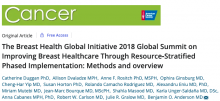
Radiotherapy resources in Africa: an International Atomic Energy Agency update and analysis of projected needs
SUMMARY
The number of patients with cancer in Africa has been predicted to increase from 844 279 in 2012 to more than 1·5 million in 2030. However, many countries in Africa still lack access to radiotherapy as a part of comprehensive cancer care. The objective of this analysis is to present an updated overview of radiotherapy resources in Africa and to analyse the gaps and needs of the continent for 2030 in the context of the UN Sustainable Development Goals.
2021 GNCDA grant winners announced!
After a careful review of all applications, 7 grant awardees for the microresearch and NCD grants for graduate students have been selected. You can see the list of winning projects here. Congratulations to the winners!

Decolonizing Cancer Care in Canada
Highlights Cancer incidence and mortality in Indigenous peoples of Canada are increasing These populations face modifiable risk factors and lack of access to care Indigenous cancer care has been jurisdictionally complex and ambiguous Successful initiatives must be locally contextualized, with Indigenous leadershipGNCDA 2021 calls for grant proposals extended!
The GNCDA 2021 calls for grant proposals which was published on June 5, 2021 have been extended! These grants are designed for graduate students, health professionals and medical residents. Whilst the eligibility criteria and requirements remain the same, the deadlines have been extended by one month.
To see the requirements or to apply, review the funding page.

Micro-grants for NCD research in resource-limited communities
The GNCDA is pleased to announce its 2021 call for applications for NCD research in resource-limited communities. There are grants available for graduate students, health professionals, medical residents, as well as early career and senior researchers. Projects submitted for these grants are typically completed in one year. More information
Breast Cancer Treatment: A Phased Approach to Implementation
ABSTRACTOptimal treatment outcomes for breast cancer are dependent on a timely diagnosis followed by an organized, multidisciplinary approach to care. However, in many low‐ and middle‐income countries, effective care management pathways can be difficult to follow because of financial constraints, a lack of resources, an insufficiently trained workforce, and/or poor infrastructure.

The Breast Health Global Initiative 2018 Global Summit on Improving Breast Healthcare Through Resource-Stratified Phased Implementation: Methods and Overview
BACKGROUND
The Breast Health Global Initiative (BHGI) established a series of resource-stratified, evidence-based guidelines to address breast cancer control in the context of available resources. Here, the authors describe methodologies and health system prerequisites to support the translation and implementation of these guidelines into practice.
METHODS

Algeria's Partnership with The Ottawa Hospital on Innovative Radiation Therapy Techniques
Algeria’s Ministry of Public Health – recognizing the country’s need for greater access to advanced radiotherapy technology and techniques for cancer patients and the healthcare professionals that treat them – has invested heavily in radiation therapy solutions over the last few years.
